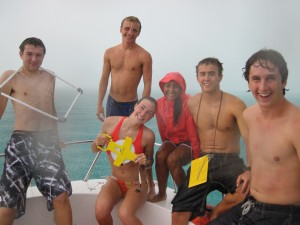[slideshow]
The joint CEI and University of Illinois shark research team just returned from the second of four, 2 week field expeditions to a shallow bank known as “the bridge” that connects the southern tip of Eleuthera to the northern tip of Cat Island. The first expedition went out in November 2011. The historical project is re-creating a study from a dataset detailing the diversity and abundance of shark populations in The Bahamas that took place over 30 years ago. Back then it was conducted by Captain Steve Connett and the crew of the R/V Geronimo from St Georges, Rhode Island. The current study is conducting surveys identical to those performed by Captain Connett and his crew 33 years ago, and has already discovered some very interesting results. In the original dataset, 96 sharks from six species were captured during 25 scientific longline sets. In just 12 sets, we have already caught 84 sharks from three species! Continue reading

